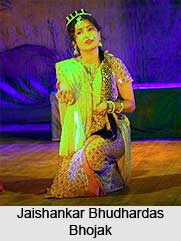 Jaishankar Bhudhardas Bhojak was an actor and director of Gujarati theatre. He was popularly known as sundari, who also performed in Hindi and Urdu. Belonging to the Bhojak performing caste, he was born in Visnagar, Mahesana district in 1889. from his childhood watching professional theatre enchanted him. From early childhood, Jaishankar was trained in acting and traditional music by his grandfather Tribhuvandas, himself a well-known singer and student of Ustad Fakharuddin. He also learnt singing from a distant relative and famed musician named Pandit Vadilal Nayak. This person helped him throughout his career as actor and director.
Jaishankar Bhudhardas Bhojak was an actor and director of Gujarati theatre. He was popularly known as sundari, who also performed in Hindi and Urdu. Belonging to the Bhojak performing caste, he was born in Visnagar, Mahesana district in 1889. from his childhood watching professional theatre enchanted him. From early childhood, Jaishankar was trained in acting and traditional music by his grandfather Tribhuvandas, himself a well-known singer and student of Ustad Fakharuddin. He also learnt singing from a distant relative and famed musician named Pandit Vadilal Nayak. This person helped him throughout his career as actor and director.
The first phase of his career began in 1897 when he joined Dadabhai Thuthi`s company in Calcutta, and then, in 1901, Mumbai Gujarati Natak Mandali. This was owned by Chhotalal Kapadia. He also performed at Gaiety Theatre in Bombay. His first major role was as the heroine Sundari in Saubhagya Sundari i.e. `Fortunate Sundari` in 1901. This was loosely adapted from Shakespeare`s Othello. He became so popular that he was henceforth called `Sundari` i.e. `beauty`. Even the renowned Marathi actor Bal Gandharva said that he had learnt a thing or two from Sundari. His female impersonation jugal juari i.e. `Jugal the Gambler`, Kamlata i.e. `Lovestruck Girl`, Madhu bansari or `Sweet Flute`, and Sneh Sarita i.e. `River of Affection`, opposite Bapulal Nayak as the male lead, was highly appreciated. Wearing women`s attire, he would mingle with ladies and make them so comfortable that they hardly ever knew that he was not a woman. What clothes he wore, and how, became the latest fashion for ladies of the business community in Bombay.
Sundari or Jaishankar Bhudhardas Bhojak was deeply interested in good literature. Bapulal and he brought to the professional Gujarati theatre highly acclaimed works of respected writers. The list includes the novel Saraswatichandra by Govardhanram Tripathi and plays by Mulshankar Mulani and Nrisinh Vibhakar. After a fulfilling career, Sundari retired in 1932 and virtually exiled himself to his home town.
However, Sundari was destined to contribute more to theatre. With Rasiklal Parikh and Ganesh Mavlankar, he organized a theatre school and performing troupe called Natmandal. This was responsible for epoch-making productions such as Parikh`s Mena Gurjari i.e. `Mena of Gujarat` in 1953. In which he assimilated elements of Bhavai and Beijing Opera. He thus provided a direction to the `new` emerging Gujarati theatre, and trained a host of actor-directors such as Jashwant Thaker, Dina Pathak, Pransukh Nayak, and Kailash Pandya.
The environment for experimentation created around him and, later, his colleagues and students should be considered another major achievement. This included inspiring Parikh to write Sharvilak based on Sudraka`s Mricchakatika. The way he directed Pransukh Nayak to play Jivram Bhatt in Dalpatram`s Mithyabhiman or `False Vanity` in 1955 in a new Bhavai form, heralded the revival of this folk genre. Sundari`s autobiography Thodan ansu thodanphul i.e. `Some Tears, Some Flowers` in 1976 is a frank document of life behind the curtains. Sundari and Jashwant Thaker are recognized as the chief theatre personalities behind the director-centred phase in Gujarati theatre of the 1950s. Jaishankar Bhudhardas Bhojak or Sundari died in the year 1975.




















